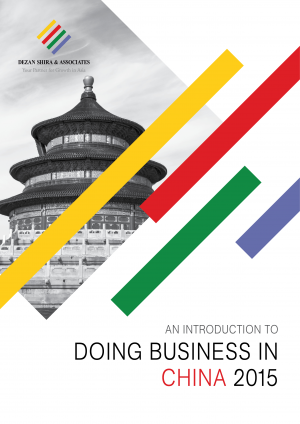China Outbound: Corporate Establishment in ASEAN & Investment Environment in India
Our Latest Round-Up of Business News Affecting China-Based Businesses Investing in Asia
In this edition of China Outbound, we start with the challenging corporate establishment procedure in ASEAN nations, with a focus on the South China Sea arbitration and its implications on ASEAN investors. From there, we move to an introduction to Vietnamese product labeling requirements, as well as the country’s new decree for investment violations. Lastly, we look into India’s business environment, highlighting its new insolvency and bankruptcy bill, and the revised reinsurance rules, which was re-drafted for the third time and is expected to create new hurdle for foreign reinsurers in India.
The Guide to Corporate Establishment in Myanmar
The IMF projects Myanmar to be the world’s fastest growing economy in 2016, with GDP forecast to advance by 8.6 percent. Still considered a frontier economy, Myanmar is at a young but developing stage for foreign direct investment (FDI) within ASEAN. Not only does the nation offer fertile land, bountiful resources, and a strategic geographic location, but the Government is increasingly committed to encouraging foreign investment through major economic and political reforms. The reform process began in 2011 and has successfully increased trade and FDI, contributing to 8.3 percent real GDP growth in the 2013/14 fiscal year, which topped the preceding year’s 7.3 percent growth.
South China Sea Arbitration Implications on ASEAN Investors: an Overview
In a landmark case, the Hague’s Permanent Court of Arbitration delivered a unanimous decision earlier this month supporting the Philippines in its territorial dispute with China over part of the South China Sea. The case brought by the Philippines was the first time the Chinese government had been brought before an international court.
An Introduction to Vietnamese Product Labeling Requirements
On the heels of inspections carried out in June, Coca Cola Beverages Vietnam Ltd. has been issued a US$19,300 fine and was forced to temporarily suspend select sales for violating food safety licensing and labeling requirements. While seemingly serious in nature, the target of inspections – Samurai Energy Drink – fell afoul of regulators for a simple failure to label levels of folic acid within their beverages and to obtain licensing as a supplementary drink.
Highlights of Vietnam’s New Decree for Investment Violations
The recent ascension to office of Nguyen Xuan Phuc, Vietnam’s new Prime Minister, has opened the gateway to several legislative changes. One such change is Decree 50, signed on June 1, 2016 and effective starting July 15, 2016, which details updated penalties for administrative violations in planning and investment for businesses and investors. The decree covers the administration of public investment projects, domestic and overseas investment in Vietnam, and bidding investment. More importantly, the decree also sheds more light on the business registration process for different business models in Vietnam.
Deciphering India’s Insolvency and Bankruptcy Bill
The Indian government’s attempts to ease doing business currently seem one-sided. Facilitating market entry and tearing down barriers to production and trade are just one side of the coin. The other involves allowing defunct, unhealthy firms to seamlessly exit the market, where they can easily liquidate their assets.
New Hurdle for Foreign Reinsurers in India
Last year we reported favorably on reinsurance rules codified in the Insurance Laws Amendment Act 2015. At the time, the amendments to foreign direct investment (FDI) caps for reinsurance were considered to be one of the most significant provisions of the new law. While the Insurance Laws Amendment Act 2015 capped FDI for life and most non-life insurance companies at 49 percent, it allowed foreign re-insurers to open branch offices in India.
|
Asia Briefing Ltd. is a subsidiary of Dezan Shira & Associates. Dezan Shira is a specialist foreign direct investment practice, providing corporate establishment, business advisory, tax advisory and compliance, accounting, payroll, due diligence and financial review services to multinationals investing in China, Hong Kong, India, Vietnam, Singapore and the rest of ASEAN. For further information, please email china@dezshira.com or visit www.dezshira.com. Stay up to date with the latest business and investment trends in Asia by subscribing to our complimentary update service featuring news, commentary and regulatory insight. |
![]()
 An Introduction to Doing Business in India 2015 (Second Edition)
An Introduction to Doing Business in India 2015 (Second Edition)
Doing Business in India 2015 is designed to introduce the fundamentals of investing in India. As such, this comprehensive guide is ideal not only for businesses looking to enter the Indian market, but also for companies who already have a presence here and want to keep up-to-date with the most recent and relevant policy changes. We discuss a range of pertinent issues for foreign businesses, including India’s most recent FDI caps and restrictions, the key taxes applicable to foreign companies, how to conduct a successful audit, and the procedures for obtaining an employment visa.
 An Introduction to Doing Business in Vietnam 2014 (Second Edition)
An Introduction to Doing Business in Vietnam 2014 (Second Edition)
An Introduction to Doing Business in Vietnam 2014 (Second Edition) provides readers with an overview of the fundamentals of investing and conducting business in Vietnam. Compiled by Dezan Shira & Associates, a specialist foreign direct investment practice, this guide explains the basics of company establishment, annual compliance, taxation, human resources, payroll, and social insurance in the country.
 An Introduction to Doing Business in China 2015
An Introduction to Doing Business in China 2015
Doing Business in China 2015 is designed to introduce the fundamentals of investing in China. Compiled by the professionals at Dezan Shira & Associates, this comprehensive guide is ideal not only for businesses looking to enter the Chinese market, but also for companies that already have a presence here and want to keep up-to-date with the most recent and relevant policy changes.
- Previous Article China Market Watch: Slowing Trade Growth, and Adjustment of China’s GDP Calculation Method
- Next Article E-Commerce in China










